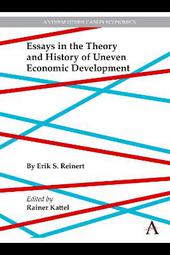
|
Essays in the Theory and History of Uneven Economic Development
Hardback
Main Details
| Title |
Essays in the Theory and History of Uneven Economic Development
|
| Authors and Contributors |
By (author) Erik Reinert
|
|
Edited by Rainer Kattel
|
| Series | Anthem Other Canon Economics |
|---|
| Physical Properties |
| Format:Hardback | | Pages:250 | | Dimensions(mm): Height 229,Width 153 |
|
| Category/Genre | Development economics
Economic history |
|---|
| ISBN/Barcode |
9781839982972
|
| Classifications | Dewey:338.9 |
|---|
| Audience | | Professional & Vocational | |
|---|
|
Publishing Details |
| Publisher |
Anthem Press
|
| Imprint |
Anthem Press
|
| NZ Release Date |
14 March 2023 |
| Publication Country |
United Kingdom
|
Description
Other Canon Economics: Essays in the Theory and History of Uneven Economic Development brings together key essays on development economics from one of the most prolific and important development economists and historians of economic policy today. Erik S. Reinert argues through essays ranging from 1994 to 2020 that neo-classical economics damages developing countries, mostly via adherence to the theory of comparative advantage. Based on a long intellectual tradition - started by the Italian economists Giovanni Botero (1589) and Antonio Serra (1613), Reinert shows that the country which trades increasing returns goods - e.g. high-end manufacture - has advantages over the country which trades diminishing returns goods - e.g. commodities. This has important implications for today's development strategies that, Reinert argues, should be seen as industrial strategies.
Author Biography
Erik S. Reinert is Professor of Technology Governance and Development Strategies at Tallinn University of Technology and also chairman of The Other Canon Foundation in Norway. He holds a BA from Hochschule St. Gallen, Switzerland, an MBA from Harvard University, and a Ph.D. in economics from Cornell University. Lecturing in five languages, Reinert's work has taken him to more than 65 different countries. His book How Rich Countries Got Rich...and Why Poor Countries Stay Poor has been published in more than 20 languages.
|